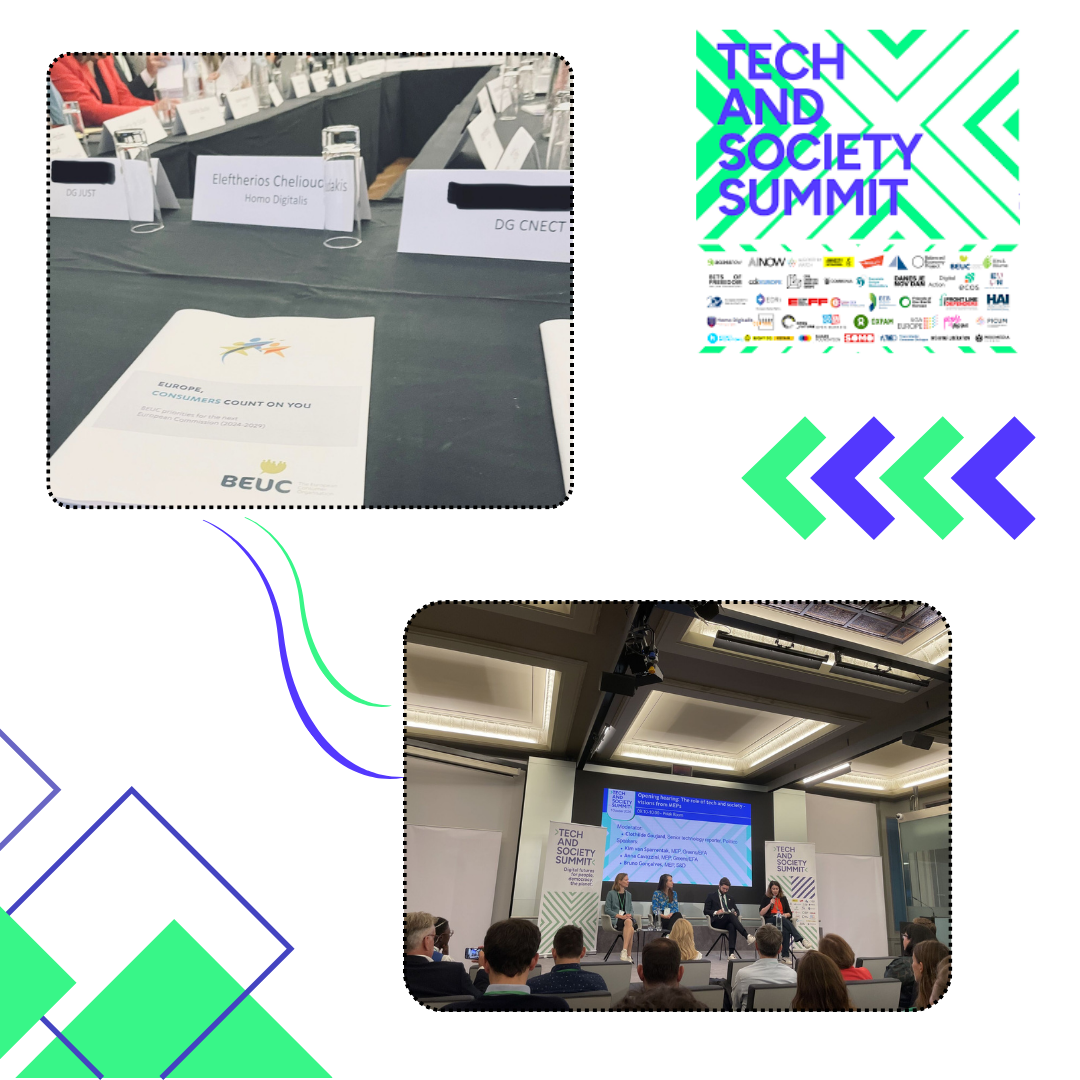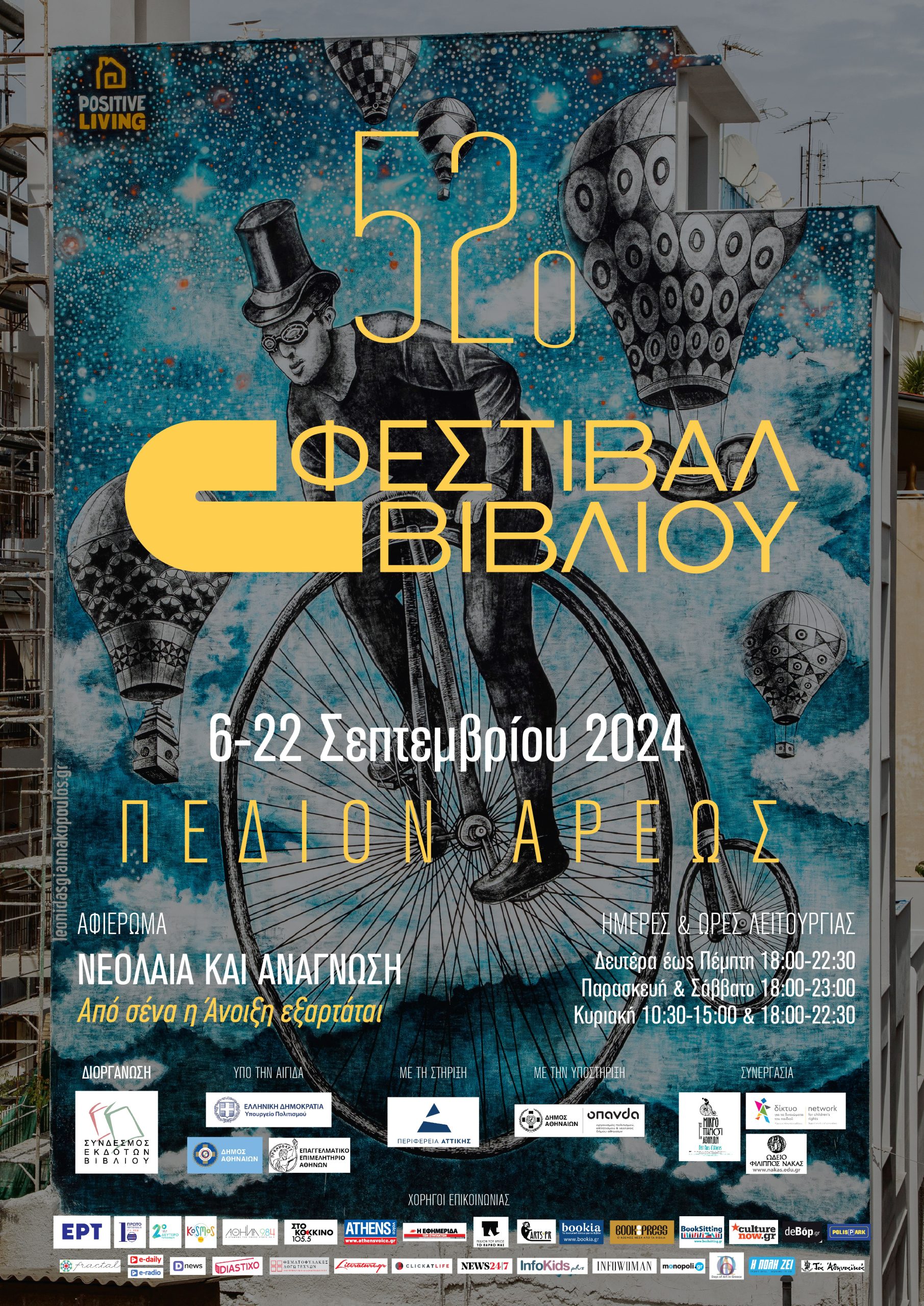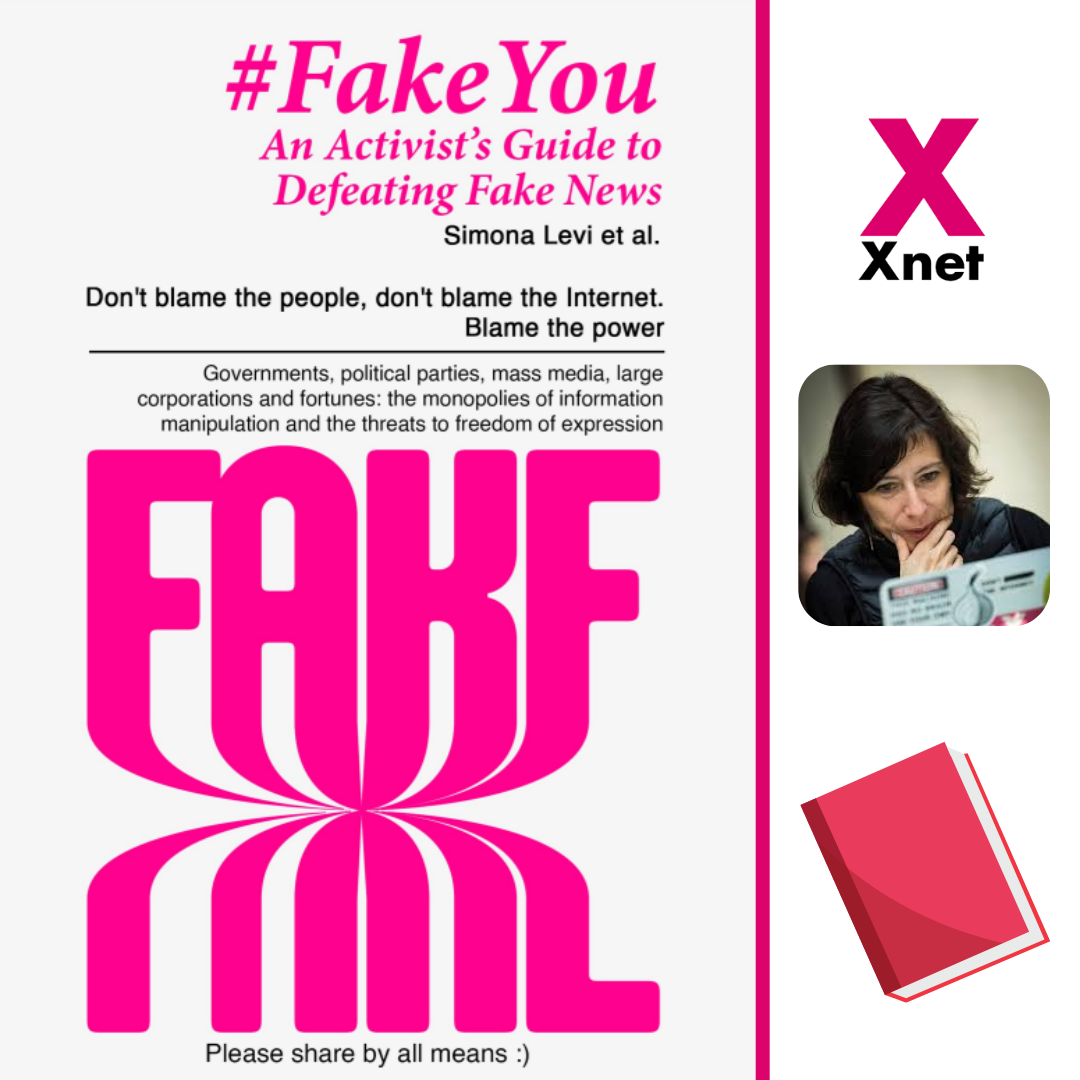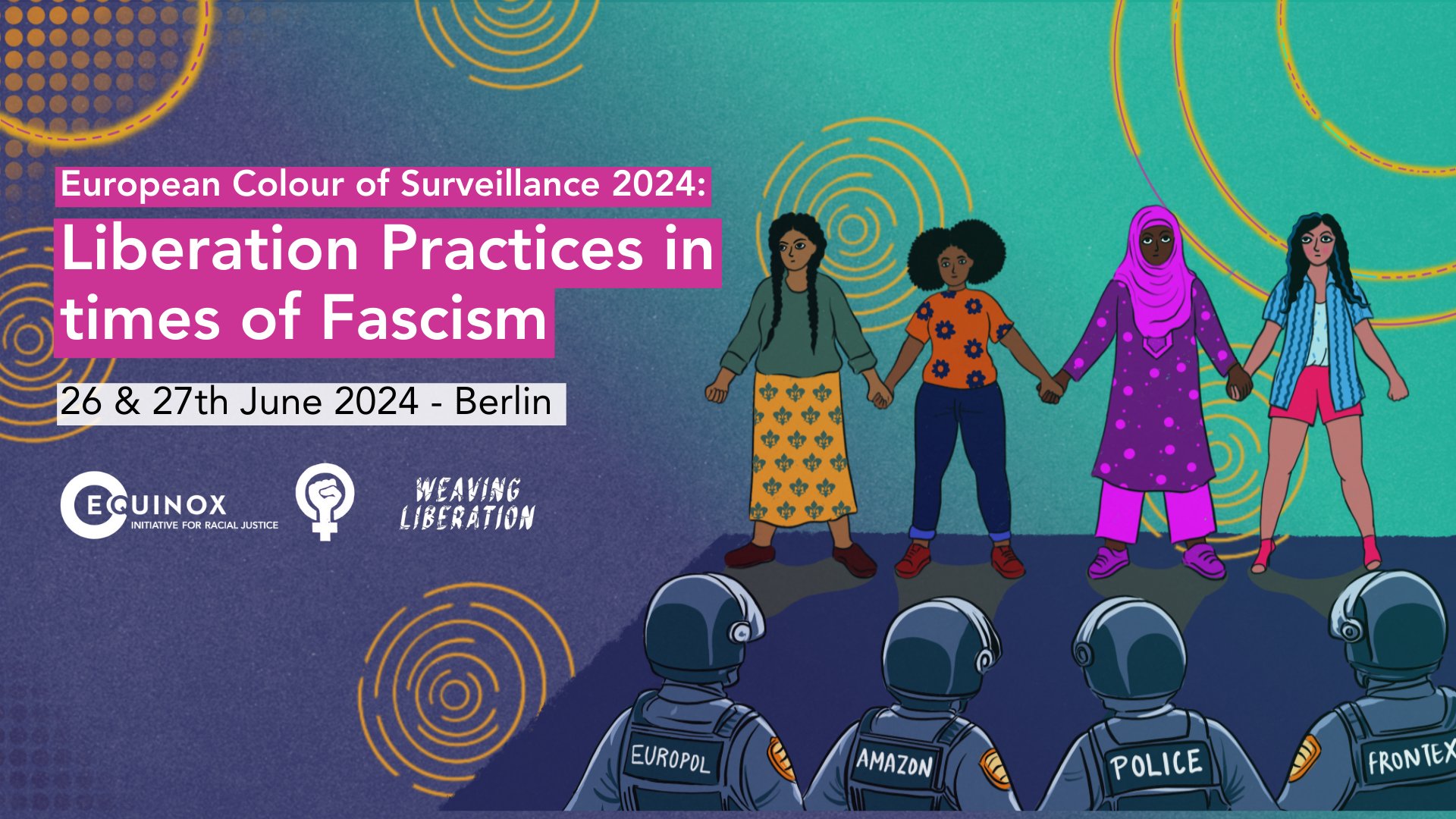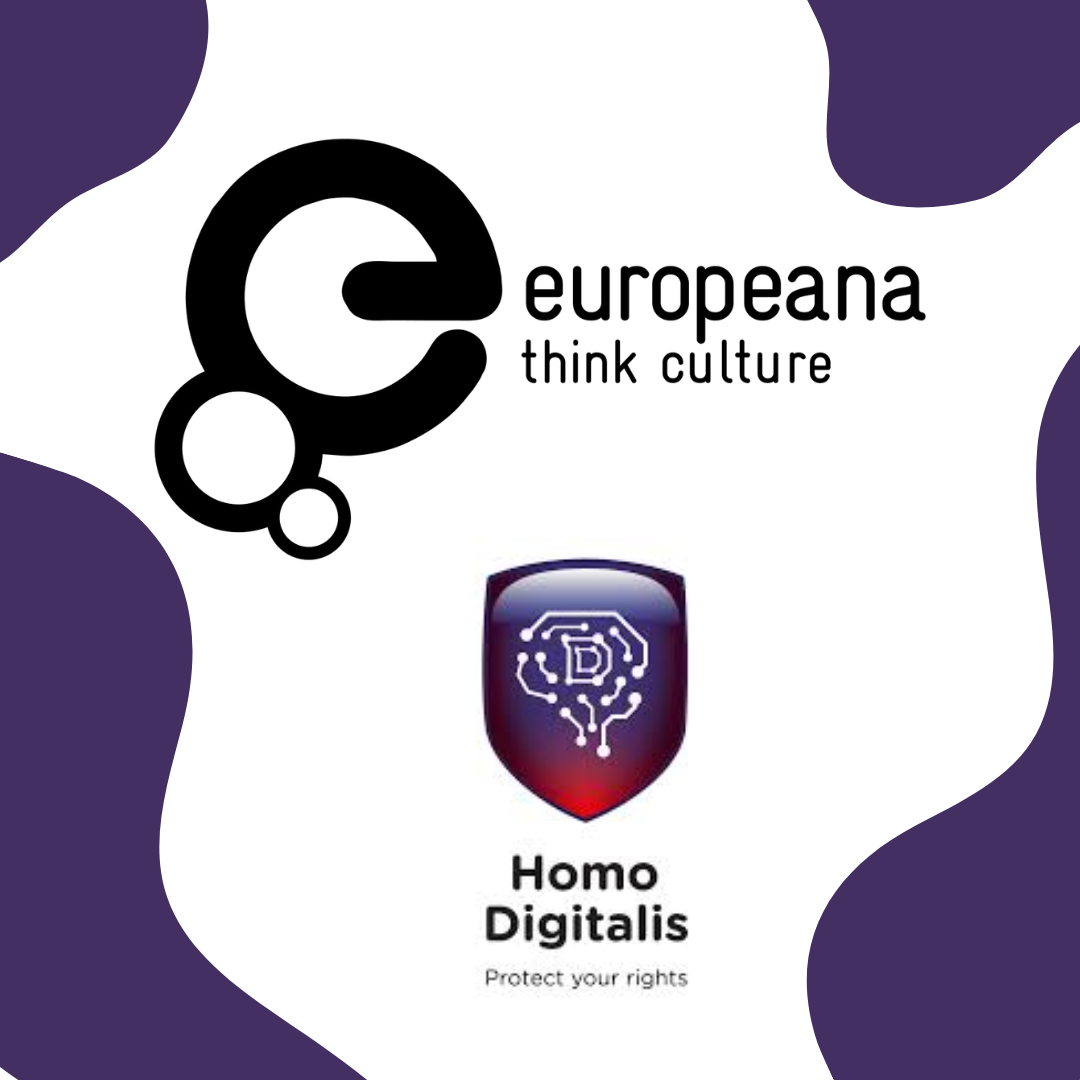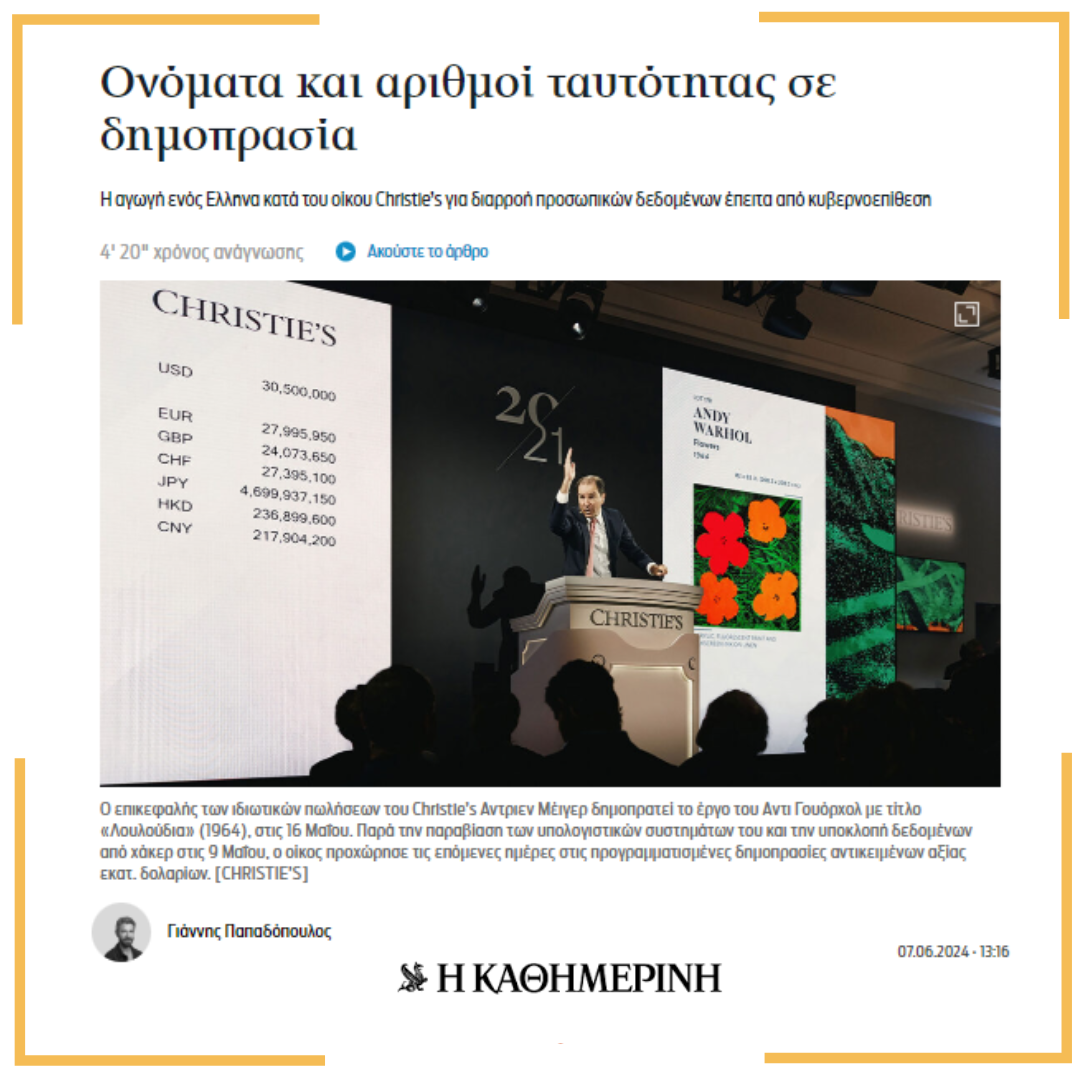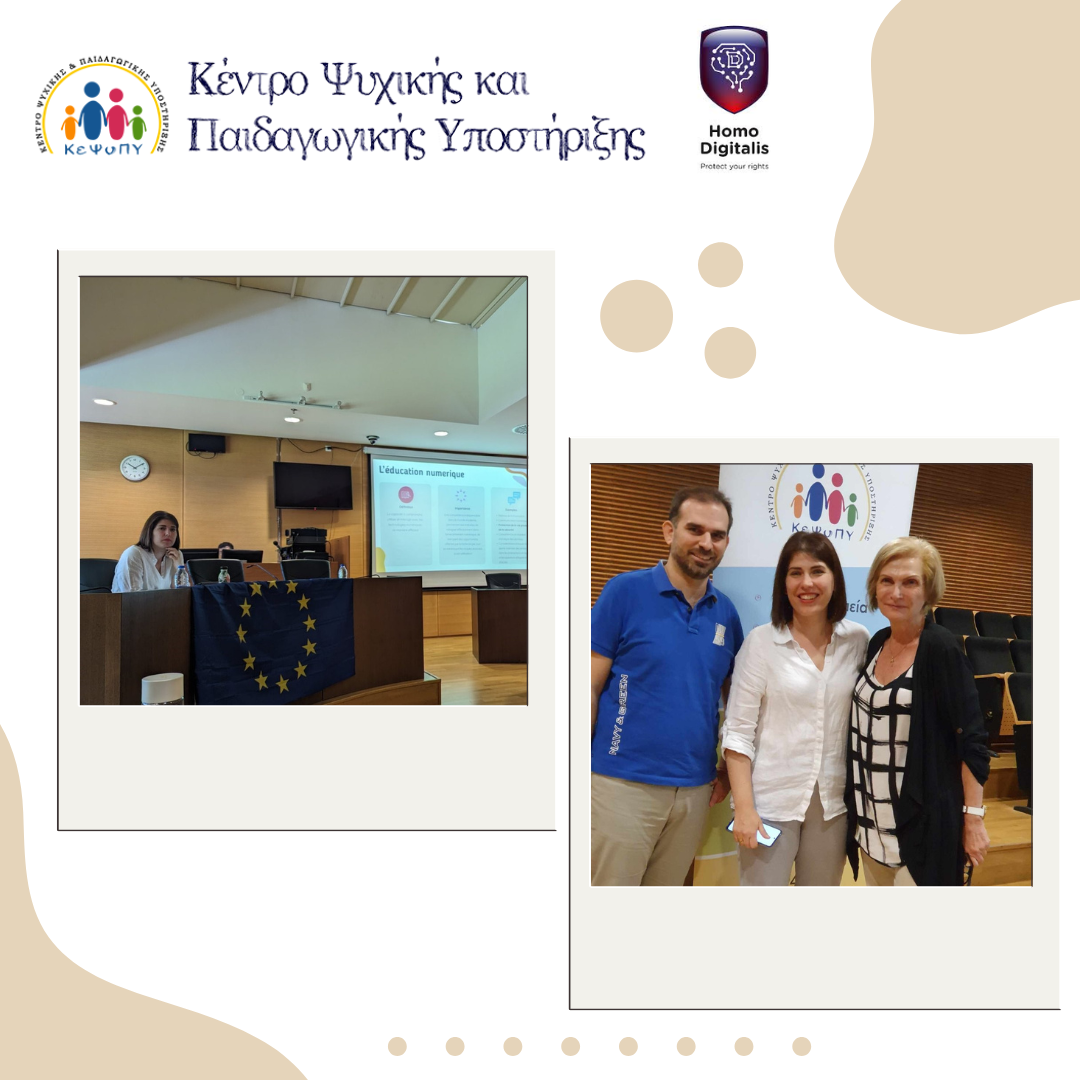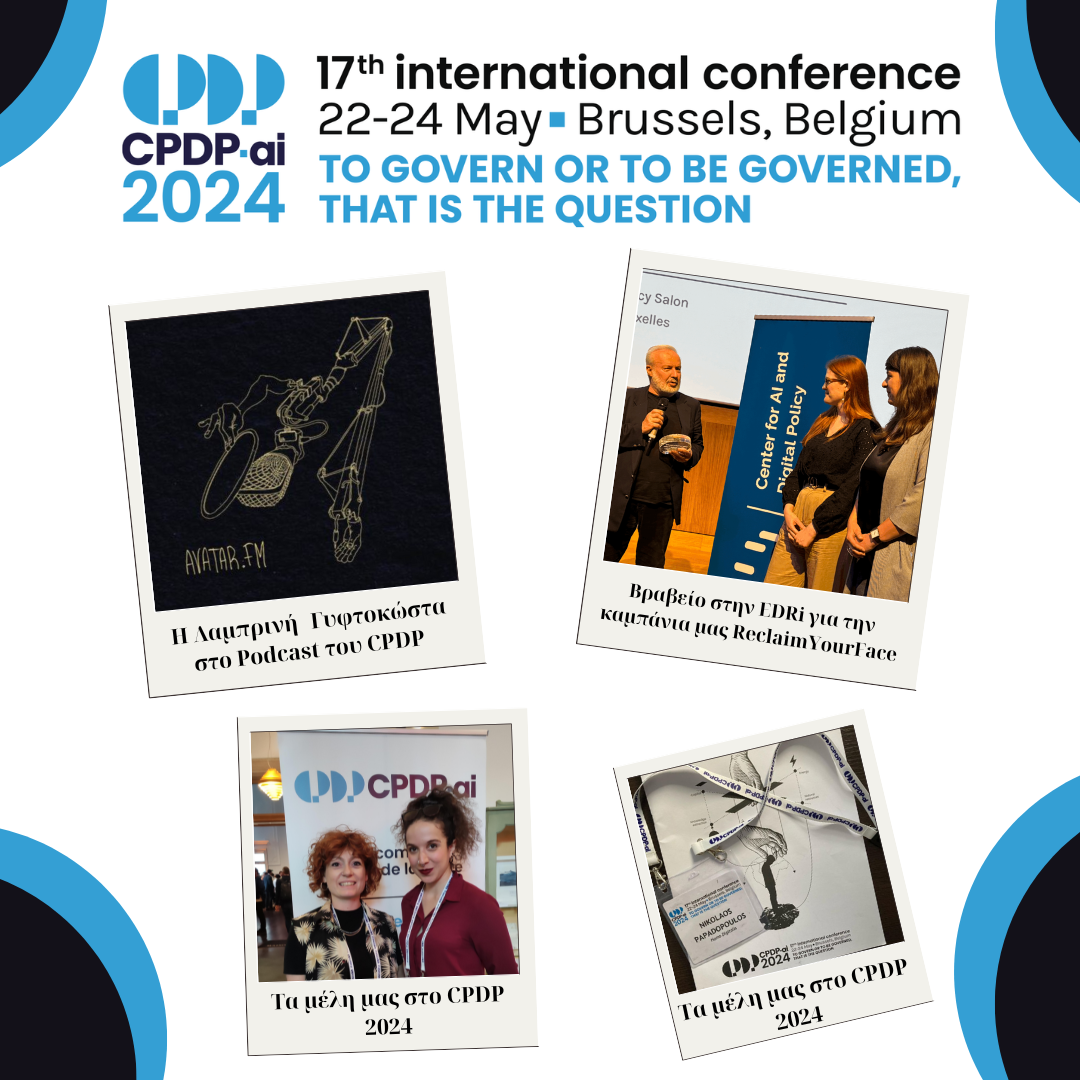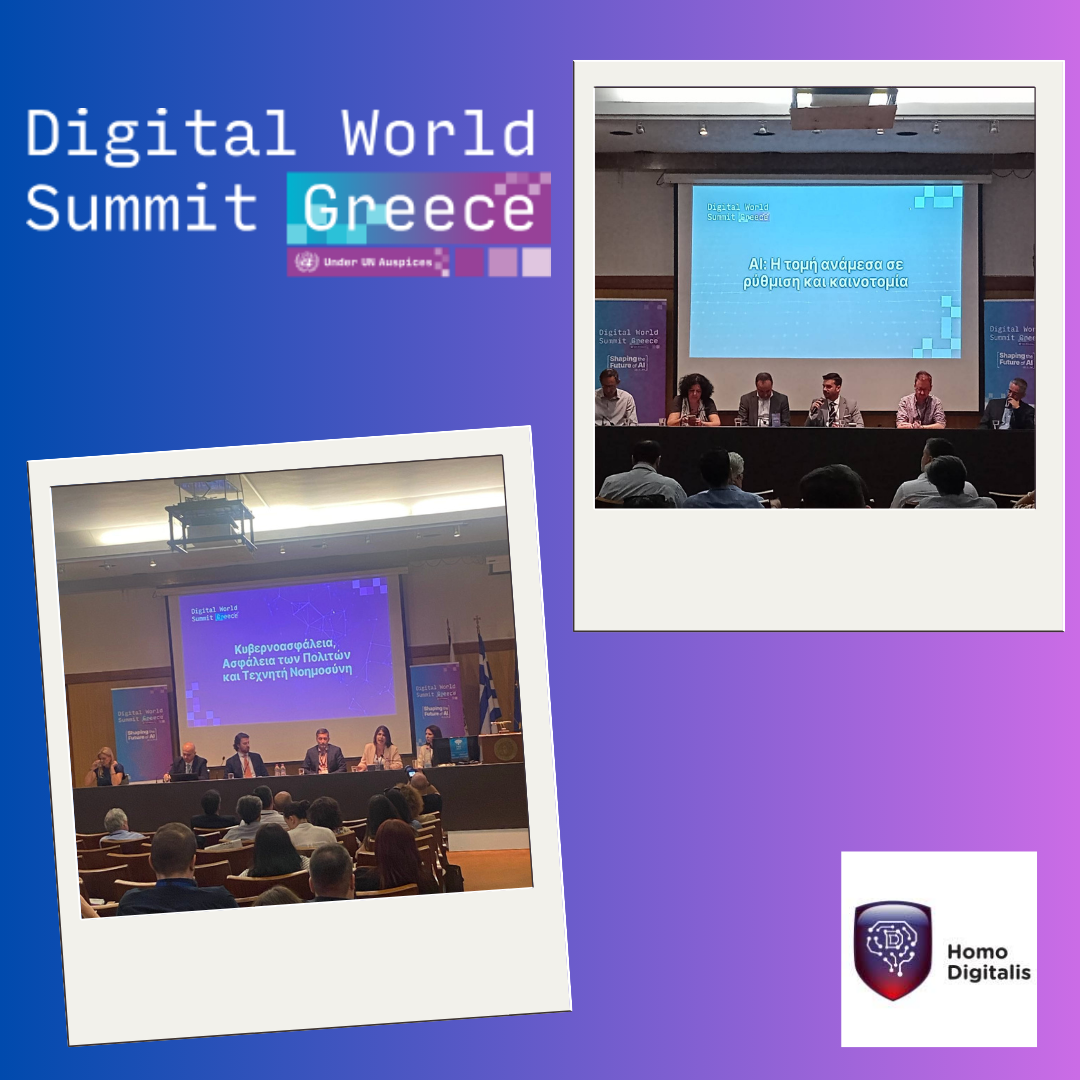Homo Digitalis spoke at the Tech & Society Summit in Brussels
Last Tuesday 1/10, Homo Digitalis was in Brussels, participating at the Tech and Society Summit co-organised together with the European Digital Rights and more than other 40 organisations!
This event aimed to bring civil society’s voices to the forefront of EU’s digital policy debates. Together we are building this space to create a bridge between digital rights organisations and new policymakers to achieve accountable, people-focused policies that advance everyone’s digital rights.
Eleftherios Chelioudakis, represented us in the Summit speaking at the session “Visionary Round-table: Building an EU Digital Enforcement Strategy” organised by BEUC – The European Consumer Organisation and moderated by European Digital Rights’ Itxaso Domínguez de Olazábal! It was a unique opportunity for us to share our enforcement actions aiming at facilitating redress of harmed individuals in Greece!
Also, we actively participated in the Round-table Fundamental Rights in focus: Joint efforts for Spyware Regulation in the EU, organised by Centre for Democracy & Technology Europe and Amnesty International, sharing insights from the latest developments of the PREDATOR scandal in Greece and the related legislative initiatives of the Greek State.
We would like to sincerely thank the organizers for inviting Homo Digitalis to participate and share our views and actions on these important topics!
Participation of Homo Digitalis in the 52nd Book Festival
Homo Digitalis has the great honour to be present at the 52nd Book Festival taking place at the Pedion tou Areos.
Specifically, on Thursday 19 September at 20:15, our co-founder and President Elpida Vamvaka will participate as a speaker in a round table organized on the main stage of the festival by the Association of Book Publishers (S.E.B.) & the Hellenic Comics Academy on the topic “Is art written with AI?”
The discussion will be moderated by Panagiotis Papageorgiou (Lawyer, Member of the Greek Comics Academy) and Dimitris Doukoglou (illustrator, presenter, stand-up comedian).
Other important speakers of the round table include Vassilis Vlahokyrikakos (Associate Professor of Human-Computer Interaction) , Abraham Kawa (Author, Translator & Theorist of Culture) and George Nathaniel (IT and Management Consultant).
You can find out more about the full Festival programme here.
New Book: #FakeYou – Don’t blame the people; don’t blame the Internet. Blame the power
Our friends from the digital rights civil society organization Xnet published recently the book “#FakeYou – Don’t blame the people; don’t blame the Internet. Blame the power”.
The book’s lead author is Simona Levi, while it is the activist’s guide to defeating fake news and blocking policies that use disinformation to curtail civil rights and freedoms.
You can freely read and download the book here.
Homo Digitalis speaks at the 2nd Colour of Surveillance Conference
Homo Digitalis has the great honour and pleasure to speak at the 2nd European Colour of Surveillance Conference “Liberation Practices in times of Fascism”, which this time is being held on 26 & 27 June in Berlin by the organisations Equinox Initiative for Racial Justice, International Women* Space and Weaving Liberation!
Specifically, Homo Digitalis’ Director of Human Rights & AI, Lamprini Gyftokosta, will give a speech in the framework of the Workshop “Blue: the colour of surveillance In Greece: lessons from challenging Migration Tech” during the second day of the conference!
We would like to thank the organizers for the kind invitation and hospitality!
You can learn more about the conference programme here.
Translated with DeepL.com (free version)
Homo Digitalis is a member of the Europeana Network Association (ENA)
Homo Digitalis is now a member of the Europeana Network Association (ENA)! ENA is under the auspices of the Digital Library Europeana, which offers access to millions of books, maps, audio recordings, photographs, archival documents, paintings and films, as well as other materials from national libraries and cultural institutions in the 27 Member States of the European Union. ENA is a strong and democratic community of people working, studying or interested in digital cultural heritage and the use of new technologies in education and the arts.
Homo Digitalis is involved in three different working groups: The EuropeanaTech Community, the Europeana Education Community και the Europeana Copyright!
Despite the fact that we have already been in contact since 2018 and have participated in events and presentations of Europeana’s work, it is a great honour and pleasure for Homo Digitalis to be now an official member of ENA!
In these working groups we will be represented by our Co-Founder, Eleftherios Chelioudakis.
We spoke to the newspaper Kathimerini and journalist Yannis Papadopoulos about the leak of personal data to Christie's Auction House
On 30 May, international auction house Christie’s sent an email to its customers to inform them that their personal data had been hacked, and on 3 June a lawsuit was filed in New York for damages against the international auction house.
The journalist of Kathimerini newspaper, Yiannis Papadopoulos, wrote a detailed article on this case, and Homo Digitalis provided relevant comments, with Eleftherios Chelioudakis representing us.
We thank the journalist for his interest in our views.
You can read the article here.
We spoke at an event hosted by KEPSIPI in the context of the Erasmus+ Digital Learning and Social Intervention programme
On Thursday 23rd of May we had the pleasure to participate in the event organized by KEPSIPI in the framework of the Erasmus+ Digital Learning and Social Intervention project and to talk about digital learning and the importance of personal data for social workers from Greece, Belgium, France, Luxembourg and Romania and the challenges of using AI tools in the field of social intervention. We would like to thank Ms. Margarita Moraitou for the invitation and her efforts to highlight this issue both nationally and European-wide.
Our Director for AI and New Technologies, Lamprini Gyftokosta, spoke representing Homo Digitalis at the event.
You can learn more about the work and activities of the Centre for Mental and Pedagogical Health here.
Homo Digitalis' participation in CPDP 2024 was a great success
For another year, and consistently since 2019, Homo Digitalis was present at the internationally renowned Computers, Privacy & Data Protection (CPDP) conference in Brussels!
We are honored that the organizers chose us to participate in the conference podcast series, with our Director for AI & Human Rights, Lamprini Gyftokosta, analyzing our pending cases before the Data Protection Authority in Greece, and our significant successes so far!
Also, another very nice moments of ours at the event, is EDRi’s award from the Center for AI and Digital Policy (CAIDP) “AI Policy Leader in Civil Society” regarding our joint campaign ReclaimYourFace, of which Homo Digitalis is a co-founding member!
Of course, it is always unique for us to see our members actively participating in the conference and have a dynamic presence in discussions, panels and other events both with their Homo Digitalis hat and that of their professional capacity Thank you very much for proudly representing Homo Digitalis at this conference every year!!!
Homo Digitalis' participation in the Digital World Summit Greece was a great success
Homo Digitalis had the great honor and pleasure to be present with double representation at the Digital World Summit Greece, today Tuesday, May 28th at the National Hellenic Research Foundation!
Specifically, our Vice President and Partner at Digital Law Experts (DLE), Stefanos Vitoratos, participated as a moderator in the 1st panel of the conference, on the topic “#AI: The intersection between regulation and innovation”, in a fascinating discussion with speakers such as Dimitris Gerogiannis (President AI Catalyst), Lilian Mitrou (Professor, Department of Information & Communication Systems Engineering, University of the Aegean), Charalambos Tsekeris (President of the National Bioethics & Technology Ethics Committee), Yannis Mastrogeorgiou (Special Secretary for Long Term Planning, Presidency of the Greek Government) and Fotis Draganidis (Director of Technology at Microsoft Hellas).
Our Director for Human Rights & Artificial Intelligence, Lamprini Gyftokosta, was a speaker at the 2nd panel of the Digital World Summit Greece 2024, on “Cybersecurity, Citizen Security and Artificial Intelligence”! The panel was moderated by Konstantinos Anagnostopoulos (Co-founder & Director, Athens Legal Tech), while Natalia Soulia (Senior Associate | Privacy, Data Protection & Cybersecurity, KG Law FIrm) was also present as a speaker, Thomas Dobridis (Head of the General Directorate of Cybersecurity, Ministry of Digital Governance), Antonis Broumas (Head of Law and Technology, EY Platis-Anastasiades) and Stella Tsitsoula (Founder, RED. comm, Co-Founder | Women4Cyber GR | Founder Hellenic Cybersecurity Institute)!
We would like to thank the organizers for their kind invitation, as every year, to this important conference.
